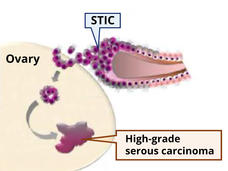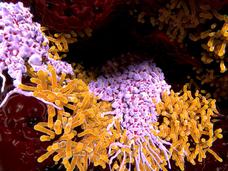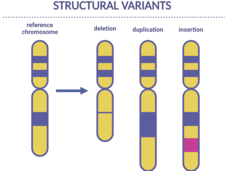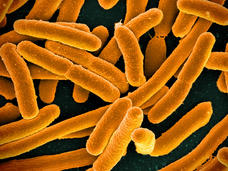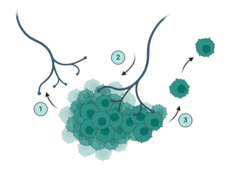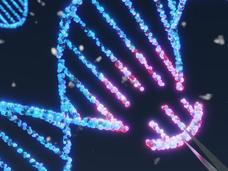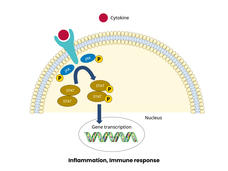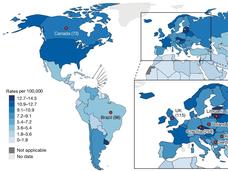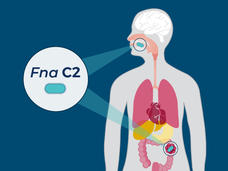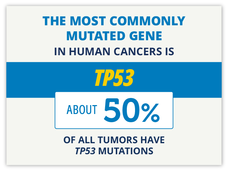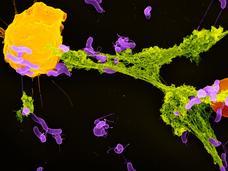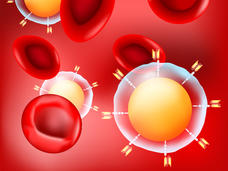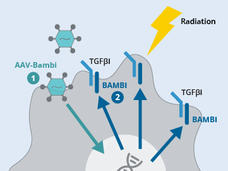Biology of Cancer - Cancer Currents Blog
Cancer biology research news, with context from experts at NCI and elsewhere. Topics include cancer metastasis, the tumor microenvironment, and new targets for cancer therapies.
-
As Rates of Some Cancers Increase in Younger People, Researchers Search for Answers
As diagnoses of colorectal, breast, and other cancers continue to climb in people under age 50, researchers are trying to understand what’s behind this phenomenon. Is it environmental exposures, genetics, lifestyle? The culprits, they say, remain unclear.
-
What’s at the Root of Ovarian Cancer? New Study May Have Found Part of the Answer
A subgroup of mesenchymal stem cells, called high-risk MSCs, appears to fuel the formation of cancerous lesions in the fallopian tubes and the lesions’ transition to ovarian cancer, a study has found.
-
Expanding Research on Dormant Cancer Cells Aims to Prevent Metastasis
Some cancers come back many years after successful treatment, often as metastatic disease. Researchers believe if and how this happens is heavily influenced by dormant cancer cells and their interaction with the immune system.
-
Experimental Treatment Uses Engineered Fat Cells to “Starve” Tumors
Researchers have developed a form of cancer treatment that uses fat cells engineered to aggressively consume nutrients like glucose. When implanted in mice, the engineered cells appeared to outcompete tumors for nutrients, shrinking tumors.
-
Scientists Find Genetic Changes Linked to Cancer in Children
Certain inherited genetic changes are likely involved in the development of some cancers in children, a new study shows. The changes, called structural variants, were linked with a small percentage of children with neuroblastoma, Ewing sarcoma, and osteosarcoma.
-
Fructose Fuels Cancer Growth Indirectly, Lab Study Finds
Researchers have found that feeding fructose, a main component of high-fructose corn syrup, to lab animals with cancer made their tumors grow faster. But the tumors couldn’t directly consume the sugar—it had to take a detour through the liver first.
-
A “Living Medicine:” Engineered E. coli Shrink Tumors in Mice
In a pair of studies, researchers engineered a probiotic strain of E. coli called Nissle 1917 so it can help the immune system attack tumors. Although the E. coli were altered in different ways, resulting in two different immune-based treatment strategies, both were effective in mice.
-
Treatment Strategy for ecDNA-Driven Tumors Shows Potential
Researchers have found that cancer cells containing extrachromosomal DNAs (ecDNAs) have a weakness that can be exploited by a drug that targets the CHK1 protein. In mice, combining the drug with another targeted therapy kept cancer at bay for long periods.
-
Breast Cancer May Spread by Recruiting Nearby Sensory Nerves
A new study may provide important new insights into breast cancer metastasis. Blood vessels within tumors release a molecule that draws sensory nerves closer to the tumors, the study shows. This close proximity turns on genes in the cancer cells that drive metastasis.
-
Study Identifies Hundreds of Potential Targets for Cancer Drugs
Researchers have identified hundreds of promising targets for existing drugs or potential new cancer drugs. The findings relied heavily on proteogenomic data from more than 1,000 tumors representing 10 types of cancer released last year by NCI's CPTAC program.
-
DNA from Ancient Viruses Helps Many Cancers Grow
DNA fragments from retroviruses that are millions of years old appear to be active in a variety of cancers, a new study found. One virus-derived DNA fragment in particular, known as LTR10, turns on cancer-related genes in multiple types of cancer.
-
To Combat Cancer Treatment Resistance, Researchers Try Leveraging Evolution
Scientists have developed a strategy for treating cancer that takes advantage of tumors’ ability to rapidly evolve and turns it against them. It involves intentionally making some tumor cells resistant to a specific treatment from the get-go.
-
Can Chemo Help KRAS Inhibitors Work Better Against Pancreatic Cancer?
Two new studies in mice show that adding chemotherapy to the experimental KRAS inhibitor MRTX1133 greatly reduced tumor growth and spread compared with either treatment alone.
-
Drug Combo JAKs Up Immunotherapy in Two Clinical Trials
Scientists have been searching for ways to make immune checkpoint inhibitors work for more patients. In two trials, researchers explored a possible role for JAK inhibitors, which dampen chronic inflammation.
-
Tumor Signatures May Help Explain Global Differences in Kidney Cancer Rates
By analyzing patterns of DNA mutations in kidney cancers from people around the world, researchers have discovered new clues about possible causes of the disease. Identifying these mutational signatures might lead to strategies for preventing kidney cancer.
-
Scientists Link a Single Type of Bacteria to Colorectal Cancer
NCI-funded researchers have pinpointed a single type of the bacterium F. nucleatum that appears to fuel the development and growth of colorectal cancer. In mice, the bacterium, Fna C2, appeared to cause more adenomas to form in the large intestine and it was often found in human tumor samples.
-
Drug Combination May Have Potential for Cancers with TP53 Mutations
Although TP53 mutations help drive the growth of most cancers, there are no FDA-approved therapies that target altered p53 proteins. Now a drug combination has shown promise in mice and is being tested in a clinical trial.
-
Stress-Induced Immune Changes May Help Cancer Spread
Stress-induced hormones called glucocorticoids can cause biological changes—in the form of sticky traps called NETs—that help create hospitable environments for cancer cells to form metastatic tumors, according to new research done largely in mice.
-
Stealing Strategies from Cancerous T Cells May Boost Immunotherapy
Adding a fusion of parts of two genes helped engineered T cells divide faster, kill more tumor cells, and survive longer in mice without making the T cells behave like cancer cells.
-
Manipulating an Immune Cell May Make Radiation Therapy More Effective, Study Suggests
In a new study in mice, researchers showed they could enhance radiation therapy by boosting levels of the BAMBI protein in MDSC immune cells in the tumor microenvironment. After radiation, T cells flooded into the tumor and killed tumors elsewhere in the body.

